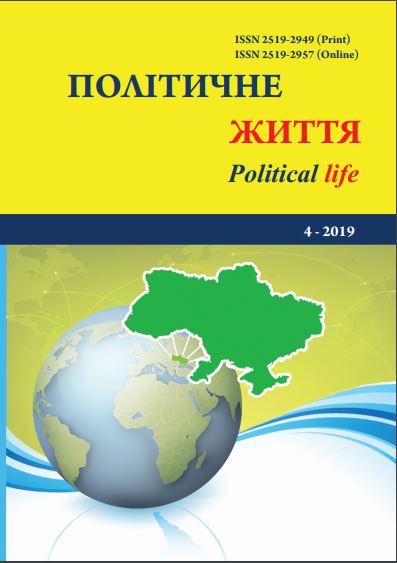Impact of the “soft power” of Turkey and the Russian Federation in the beginning of XXI century.
DOI:
https://doi.org/10.31558/2519-2949.2019.4.17Keywords:
Turkey, Russia, “soft power”, domestic politicsAbstract
The use of “soft power” in Russian-Turkish relations began in the XXI century and was asymmetric in nature. Since the 1990s, Turkey has been extremely interested in forming a new subsystem of international relations – the Turkic world. The leadership of the country did not follow in the footsteps of the European Union, which moved from economy to politics, but came up with original ways of forming this kind of super-identity. Turkey began to create various “integration fields” – cultural, educational, economic, and then political. All these “fields” served the long-term goal of uniting the Turks. The Turkic entities of the Russian Federation were involved in these processes. In the first decade of the XXI century, the “soft power” of Turkey actively acted in the Russian direction, having achieved some success in forming a positive image of the country in the Russian information field. Russia began to apply soft power only in the early 2010s, so its success in this field was moderate. However, after setting a new policy course, Russia began to pay considerable attention to this vector of interaction between countries, so in the late 2010s its successes in forming a positive image of Russia in Turkey, despite some problems, cannot be denied. In general, the Russian “soft power” operates in five areas: the political concept of “sovereign democracy”, the Russian Diaspora in Turkey, the promotion and dissemination of Russian language studies in Turkey, the high culture and education of Turkish students in Russian universities. Given that the effect of the use of “soft power” manifests itself in 5-10 years from the beginning of active activity in this direction, it is possible to predict the growth of influence of Moscow on the attitude of the Turkish population to Russia and, thus, on the domestic politics of Turkey. At the same time, the events of 2013- 2016, such as the Arab Spring and the coup attempt in Turkey, have reduced the intensity of the introduction of “soft power” elements in Turkey’s foreign policy, including the Russian direction.References
Най Дж. «Мягкая» сила и американо-европейские отношения. Свободнаямысль – XXI. 2004. № 10.
Аватков В.А., Бадранов А.Ш. "Мягкая сила" Турции во внутренней политике России. Право и управление. 2013. № 2. С. 5-11.
Öner S. Soft Power in Turkish Foreign Policy: New Instruments and Challenges. Strategic Depth through Soft Power: The Domestic Production and International Projection of Turkish Culture. URL: http://www.gce.unisg.ch/~/media/Internet/Content/Dateien/InstituteUndCenters/GCE/Euxeinos%20Folder/Euxeinos%201 0_2013_web.ashx (дата звернення: 29.10.2019).
Soft Power Survey 2012. – URL: http://monocle.com/film/ affairs/soft-power-survey-2012/. (Дата звернення – 02.09.2019.).
Совещание послов и постоянных представителей России 9 июля 2012 года. URL: http://kremlin.ru/events/president/news/15902. (Дата звернення – 02.09.2019.)
Встреча с сотрудниками МИД России 11 февраля 2013 года. URL: http://kremlin.ru/events/president/news/17490. (Дата звернення – 02.09.2019).
Сурков В. Национализация будущего. Эксперт. № 43 (537). 20 ноября 2006.
Somunoğlu A. Rusya’nın ‘Yumuşak Gücü’: Öncelikli Hedef ‘Yakın Çevre’’. USAM, Cumhuriyet Strateji, Sayі 147, 23.04.2007.
Yіlmaz S. Rusya Federasyonu Yumuşak Gücü ve Egemen Demokrasi. URL: http://usam.aydin.edu.tr/RUSYA_FEDERASYONU_YUMUSAKGUCU(4a2c).pdf. (Дата звернення – 01.04.2019).
Русский язык в Турции набирает популярность. URL: http://rus.ruvr.ru/radio_broadcast/6325932/85750364/. (Дата звернення – 02.04.2019).
Ларионова Е.И. «Мягкая сила» России в Турции: достижения, проблемы, перспективы. Российскотурецкие отношения: 2002–2012 годы (материалы Круглого стола, г. Москва, 4 апреля 2013 г.) Под ред. В.А. Аваткова, С.Б. Дружиловского, А.В. Федорченко. Москва МГИМО – Университет 2013. С. 62-72.
Interview of H.E. Mr. Mevlüt Çavuşoğlu to Estonian Public Broadcasting (ERR), 26 October 2016 URL: http://www.mfa.gov.tr/interview-of-he-mr-mevlut-cavusoglu-to-estonian-public-broadcasting-err.en.mfa (Дата звернення: 30.10.2019)
Ekşi M., Erol M. The Rise and Fall Of Turkish Soft Power and Public Diplomacy. Akademik Bakış. Vol.11. Winter 2018. P. 126-157.

